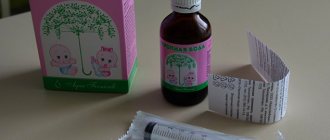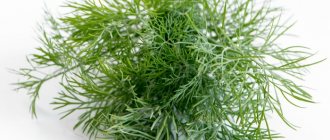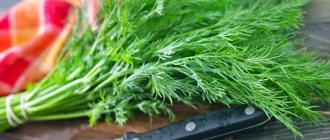Every young mother sooner or later faces the problem of constipation in her child. This may be due to various reasons. Constipation causes a lot of unpleasant sensations for the baby: pain, bloating. However, the mother suffers no less at this moment, as her newborn baby becomes very capricious and irritable.
Today there are a huge number of different drugs on the medicine market that help improve intestinal motility. But the dill water we all know remains just as popular. It is very easily tolerated by newborns and improves intestinal function. In this article we will look at whether dill water helps with constipation in newborns, how to prepare and use it correctly.
What is constipation
Normally, a newborn baby should defecate after each meal; the number of bowel movements can be from 4 to 6 times a day. With age they decrease to 2 times a day. If a child goes to the toilet once every two days, then there is no need to worry, it’s just that almost all the food is digested in the small body. But if a newborn does not poop for more than 2 days, this may indicate constipation .
What is constipation? This is a process in which feces are retained in the rectal area. This condition causes severe pain, increased gas production and bloating in the child. The baby becomes capricious, irritable, eats and sleeps poorly . Constipation can be caused by the following reasons:
- imperfection of the processes of the digestive system;
- intolerance to formula if the child is bottle-fed;
- mother or baby eating foods that cause constipation;
- nervous disorders and stress;
- sedentary lifestyle.
You can establish normal bowel function with the help of medications (for example, Motillium, Duphalac, etc.) or dill water. Let's take a closer look at whether dill water will help with constipation in newborns.
Can a child have a fever if a child is constipated?
Benefits and harms
Benefits of using preparations from the plant:
- normalization of the activity of beneficial microorganisms;
- improvement of intestinal function;
- relieving spasms;
- softening of feces;
- eliminating flatulence.
Important!
Dill seed preparations are a weak diuretic and activate the kidneys.
Possible harm from consumption:
- lowering blood pressure;
- increased bleeding;
- increased stomach acidity;
- the appearance or exacerbation of allergies;
- may increase flatulence in infants.
Basically, dill remedies act gently and safely, the dosage and concentration of substances in them is small, so you can harm yourself only by taking a large amount of the drug.
What is dill water
Dill water for constipation in infants is a very common and safe remedy. It is made from fennel seeds. It helps to quickly get rid of colic and constipation in young children. Dill water will also help improve the mother’s process of producing breast milk. You can buy a ready-made solution at any pharmacy; you can also make an infusion of fennel at home.
To make this water, only fennel seeds are used, not dill. Can be used for babies from the first months of life. Available in glass bottles of 100 ml. The technique for diluting the prepared pharmaceutical solution is indicated in the instructions for the drug.
It is important to note that this water can be stored in the refrigerator for no more than a month.
Pharmacy products
Some pharmaceutical preparations are made on the basis of this useful culture:
- Plantex. Available in the form of soluble granules, in 5 g bags.
- Bebinos. Carminative drops for children.
- Softovak. A mixture of herbal preparations, a laxative.
- Diuretic collection based on dill seed.
- Collection for the stomach and intestines.
- Dill water for babies.
At the first symptoms of such an unpleasant phenomenon as constipation, folk remedies are effective. Dill is one such herb whose use has been proven over time. But before using it, you need to consult your doctor.
If you find an error, please select a piece of text and press Ctrl+Enter.
We tried to write the best article. If you liked it, please share it with your friends or leave a comment below. Thank you! Great article 0
How does it work
This product has the following properties:
- has an antimicrobial effect on the intestines;
- causes a slight sedative effect;
- is a kind of antispasmodic;
- reduces gas formation and relieves colic.
Dill water is simply irreplaceable for newborn babies who are still getting used to eating a variety of foods. It will be very useful for mother to use it to improve the lactation process . In this case, the baby will also receive dill water along with breast milk.
Dill seed in folk medicine: application
- To combat hypertension. As a vasodilator, it helps normalize blood flow. In ordinary language, it helps the heart beat rhythmically, without failures, significantly improving the condition of arrhythmia and atherosclerosis.
- Dill fruits help solve problems with the genitourinary system, thanks to their bactericidal, diuretic, and anti-inflammatory effects.
- Improves the flow of bile and has a choleretic effect, helping to normalize secretion.
- For insomnia and stress, it calms and improves sleep.
- It has a bronchodilator effect, thinning mucus and helping to remove it from the respiratory tract.
- Externally used to treat eye diseases, fatigue, redness, swelling of the eyelids.
- Helps cure iron deficiency anemia.
- Used for cosmetic purposes: included in anti-aging masks and decoctions.
- It is a milk extractor and will help breastfeeding mothers increase their milk supply.
- Helps relieve nocturnal enuresis
Contraindications
As a rule, there are no contraindications to the use of dill water in newborns. It has a mild laxative effect and helps with bowel movements .
But if the mother notices that the child’s stool is too loose or has changed in color, this indicates the presence of a disease of the gastrointestinal tract. In this case, you should immediately seek help from a pediatrician.
Many people are interested in the question: can dill water cause constipation in newborns? Definitely not, this remedy, on the contrary, has a relaxing effect on the intestinal walls and improves digestion processes.
Contraindications to the use of dill and its components for constipation
Dill seeds in folk medicine: medicinal properties and contraindications
Dill seeds or other parts of the plant are not a medical drug, but are used as a food additive. The product cannot be called potent, but there are a number of contraindications in which the use of dill should be limited.
Among them:
- reduced blood pressure;
- gastritis and stomach ulcers with high acidity;
- days of menstruation in women;
- individual intolerance in the form of allergic manifestations;
- impaired hemostasis, tendency to bleeding.
How to take it correctly
The effect of dill water is usually observed after 40 minutes after taking it. The stool improves a few days after the start of treatment.
For newborn babies, fennel infusion can be used 6 times a day. You need to give the child 1 tsp. before each meal or mixed with formula and breast milk.
To improve the effect, it can also be used by the mother if the child is breastfed.
For adults, the dosage is 1/4 cup 3 times a day . You need to drink dill water half an hour before meals. The effect is observed within 15 minutes after administration; if a person has prolonged constipation, then the effectiveness of treatment can be achieved a week after starting to take dill water.
When treating constipation in newborns, you need to carefully monitor so that the baby does not develop allergies . Fennel is considered an allergen, so large dosages of dill water can provoke the development of an allergic reaction.
Read about other folk remedies for treating constipation in babies by following the link.
Precautions when using dill for constipation
The remedy for constipation has a delayed effect. Its effects appear only with regular use. During self-treatment with dill seeds, you need to monitor your condition. If there is no bowel movement for 5 days, it is recommended to use laxatives or consult a doctor.
Drinks in the form of infusions and decoctions of dill seeds can have a side effect in the form of an allergic reaction. It manifests itself as skin rashes (urticaria), itching.
Therefore, before use it is necessary:
- observe proportions in preparing home remedies for constipation;
- take the drug gradually, starting with minimal dosages;
- Do not drink infusions and decoctions for longer than 10 days. After the course, you can take a break for two weeks and start consuming dill seeds again.
If constipation is accompanied by conditions such as dysbiosis or inflammatory processes in the body, it is not recommended to start self-treatment with dill seeds. It is better to consult a doctor and get a drug treatment regimen, and take herbal preparations at the end of the course or for preventive purposes.
bezgemorroya.ru
Reviews
Alexandra, 27 years old:
“My son is 2.5 months old and has problems with constipation and colic. I feed him breast milk and follow a strict diet. The doctor advised using dill water before every meal.
Just a week after the start of treatment, the baby became calmer and pooped regularly. The product is natural and harmless, can be used for a long time. A jar is just enough for a month.”
Marina, 30 years old:
“After the birth of the child, I couldn’t establish milk production for a long time; I had to supplement the baby with formula. Because of this, problems with stool often occurred.
A friend advised me to try fennel seed tea for myself, and for my baby to buy dill water at the pharmacy. At first I was skeptical about this. I brewed a tea bag, it has a pleasant taste and aroma. I drank several cups throughout the day.
You won’t believe it: milk began to arrive in large volumes! I was very happy and started giving the baby dill water to prevent colic. Apparently I didn’t feel the effect, the child still suffered from increased gas formation, but everything was regular with stool. I still continue to drink fennel tea, although I finished breastfeeding a long time ago, it helps me improve the digestion process.”
What to do if a child has constipation with blood?
Recipes with dill for constipation
There are several ways to use seeds and other parts of the plant against constipation; decoctions, infusions and other remedies are used. All recipes are extremely effective if the course of treatment is carried out completely and the recipe is strictly followed.
Dill decoction
A decoction can be prepared in various ways from the leaves and seeds of the plant.
- The simplest and most effective method: pour one tablespoon of seeds into a glass of hot water, simmer over low heat for a quarter of an hour, then cool and strain. You need to drink half a glass before each meal; the course of treatment lasts up to three weeks for atonic constipation.
- A decoction of dried dill leaves mixed with raspberry, currant leaves and dried apple peel will help get rid of increased gas formation and at the same time help strengthen the body. You need to take one tablespoon of plant leaves and one spoon of apple peel, add a liter of water and bring to a boil, then keep on low heat for about ten minutes. The decoction is taken in the morning after breakfast and in the afternoon after lunch, half a glass, the course of treatment lasts until constipation goes away.
You can also add honey to the decoctions; it will help sweeten the drink and enhance the beneficial properties of dill. It is important not to add it immediately to a hot broth, otherwise it will lose its beneficial properties. The combination of honey and dill has a positive effect on the condition of the gastrointestinal tract.
When preparing decoctions, it is important not to overcook dill; with prolonged excessive heating, it may begin to lose its beneficial properties.
Infusions and juices
- An infusion of plant seeds is most useful for atonic constipation. To prepare it, add two tablespoons of dill seeds to two glasses of hot water and leave for half an hour. You should take 80 milliliters of infusion three times a day before meals.
- With increased gas formation, difficult intestinal passage, colitis, an infusion of plant seeds can help. The seeds need to be ground well so that the essential oils contained in them are released; in total, four teaspoons are needed to prepare the drug; they need to be poured with two glasses of boiling water and left for an hour. Should be taken in the morning and in the evening before meals. You should drink one hundred milliliters at a time.
- If problems with the intestines arise against the background of gastritis, juice should be squeezed out of the leaves and stems, mixed with honey, juice and honey should be one tablespoon each, take a spoonful before meals up to three times a day. This remedy will gently help cope with intestinal problems.
An infusion of dill seeds is most useful for atonic constipation.
You can also add honey, raspberry, currant, and lingonberry leaves to the infusions if there are no contraindications. It is worth remembering that infusions are always stronger than decoctions, they contain a greater concentration of essential oils and other elements, so dosages should always be small. If desired, the infusion can be diluted.
Also, we should not forget that ready-made decoctions and infusions are usually stored for a short time, no more than one day in a tightly closed container in the refrigerator. Therefore, during long-term treatment, you should prepare a fresh drink every day.
Dill water
Dill water is considered a remedy for flatulence and constipation for children, but in fact it is effective at any age. Water effectively relieves spasms in the intestines. The pharmaceutical preparation is made from the essential oil of fennel and dill, but such a remedy is not always available.
You can make an analogue of pharmaceutical dill water based on ordinary dill and its seeds. The seeds of the plant need to be ground, pour half a teaspoon with half a glass of boiling water, then leave for about an hour, then strain well. This remedy is taken by spoon before meals.
Under no circumstances should you store dill water infusion; you need to make a new remedy every day. Today, ordinary dill used in cooking is not considered the best raw material for preparing dill water; fennel is used instead.
If you have fennel oil in stock, you can make your own pharmacy water. In this case, the drug is stored longer, up to a month in a tightly closed container in the shade in a cool place. You need to take 0.05 grams of oil, literally one drop, and mix with a liter of clean water, shake. The drug is ready.
In general, if intestinal problems bother you quite often, digestion needs to be improved; it is recommended to add more dill leaves and seeds to your food. Even just using it as a seasoning, you can notice positive changes.
However, if severe constipation is persistent and accompanied by severe flatulence, nausea, abdominal pain and other symptoms, you should consult a doctor. This may indicate the development of serious diseases.
gemor.guru
Precautionary measures
A remedy for constipation based on dill or fennel seeds is well tolerated by both children and adults. The only problem may be an allergy to the components of the drug.
The manifestation of a negative reaction of the body to dill can manifest itself:
- Rashes on the skin.
- Itching.
To avoid this, it is recommended to adhere to the following rules:
- Treatment of constipation with dill water should begin with small doses. This is especially true for newborns.
- It is recommended to prepare dill or fennel tinctures strictly in accordance with the indicated dosages.
- There is no need to take dill water for more than ten days in a row. After 7-15 days, you can repeat the course of treatment.
- Before using the drug, it is recommended to check the body’s reaction to it and only after a positive effect begin full treatment.
www.lechimzapor.com











